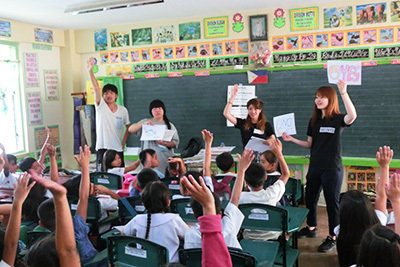The Spirit Behind the Founding of KUISs
Translation : Hamana Atushi (2018). Meeting the Challenges of Learning Outcomes-based Education. Toshindo: Tokyo. Chapter 3, Section 1-Cont
"The Challenges of the Small Regional University: The Initiatives and Issues Faced by Kansai University of International Studies," pp. 107-117.
The Spirit Behind the Founding of KUISs
My maternal grandmother (Misao Hamana) was an educator who founded a kindergarten and specialty school. When she began in 1950, during the chaos and aftermath of World War II, she keenly felt the importance of early years education. At the same time, Amagaski city in Hyogo city had a strong for such schools, so with her own money she opened a kindergarten called "The Garden of Love Kindergarten." Currently, it now receives a so-called "Children's Garden" license of the kindergarten type. As it receives a type #3 license, it is able to care for children from 2 years old within a kindergarten curriculum. At the same time, it is a Children's Garden capable of contributing to local society. Thus, the Educational Legal Entity, Hamana Academy, got its start from these kindergarten roots. It was started several years before I was born.

-
The founding spirit of our school is expressed in the four character idiomatic phrase of iai-ien (以愛為園). "Through love, one can cultivate a garden (of learning)." Through these words, it expresses its commitments to cultivate children that are tolerant and treat others with compassion. Moreover, it embodies the wish of my grandmother to treat the children with love and create a school that encourages imagination among the children. This spirit continues in the Kansai specialty school of early education and welfare.
Kansai University of International Studies (KUISs) is now almost 20 years old. Its predecessor institution was the Kansai Women's Junior College. It got it starts when a new business faculty was added that also accepted men. Even with this change, the spirit of iai-ien has continued. If one were to give a concrete example, these roots can be seen in our emphasis on cultivating graduates who contribute to society and who want to flourish in a world centered on Asia and the Pacific. With these educational goals in mind, KUISs was founded in 1998.
The first president of KUISs was the late Atsushi Murakami, a scholar who helped create the field of developmental economics. He helped create the graduate research program of developmental cooperation at Kobe University. Professor Murakami had a very strong understanding of this issue. As he said, it was his hope that, "From now on, the era of Asia and the Pacific will come; because of this, we will need to develop human resources. Developing human resources able to embrace this Asia-Pacific era will become very important to the economy of the Kansai area." At the time, I was busy with graduating from graduate school at Sophia University. I was also teaching as a professor at the junior college, and serving as the head of planning for Hamana Academy and coordinating preparation for the KUISs' founding. What I remember most is spending much energy establishing a university that would incorporate the educational goals of the first president.

-
The founding spirit of iai-ien led to the founding of a kindergarten, which eventually led to the establishment of a school to cultivate nursery schoolteachers, the Kansai Nursery School Specialty School. At the time, the field of nursery school education was an occupation for women, so-called "Nursery Mothers." However, in receiving our license from the Ministry of Welfare (today's Ministry of Welfare and Labor), we became the first school able to graduate male nursery schoolteachers. Of course, we continue to support women in realizing their professional dreams and entry into the career world, but we also have a tradition of helping other under-represented groups advance into society and career fields. In that sense, we may be said to possess a pioneering spirit.
Realizing Ultimate Universal Values through Safety and Security
KUISs has continued the spirit of Iai-Ien by emphasizing the importance of cultivating a humanity that can solve problems through working together with others, empathizing with each other, and understanding the viewpoints of the diverse peoples of this globe. We cannot simply seek to cultivate human resources that acquire knowledge, but rather we need to develop a humanity able to engage and flourish as citizens of a world increasingly centered around 21st century Asia and the Pacific.
At KUISs, our education approach is based on three key concepts: 1) Having a viewpoint that is able to respond to increasing Globalization 2) Having the ability to contribute effectively to organizations and groups as a practical leader 3) Understanding of safety education. Combined, these concepts emphasize our aim of developing adults and leaders capable of managing things safely.
As we look toward the 20th anniversary of KUISs' founding, we also have an opportunity to make changes to how we link the idea of Iai-Ien into the present and future. The different faculty within KUISs will continue their revision of their three policies (i.e. diploma policy, curriculum policy and admissions policy), but they also will be asked to think more deeply about how we integrate human compassion and tolerance into our education.
If we conceive of the ideas through the term "diversity understanding," we must confront the issue of what are universal values and how we should search for them in a world of increasingly diverse values and cultures. Our ultimate answer to this is through the concept of "safety and security." Of course, how we build this educational concept of "safety and security," and how we manage this in practice becomes the most important part of our overall education mission.

-
To have different peoples live in safety and security, it is about coexistence and not conflict. It is the ability to collaborate to ensure mutual safety and security, and by extension a safe and secure community, society and world. To build such reality, however, the urgent question then becomes what we ought to.
We believe the key to this issue lies in "safety management." If one understands management from the writings of Peter Drucker, one emphasizes the need to enable an organization to maximize its functions. This is not an idea simply limited to the management world, it is also applicable to education, nursing, or disaster prevention. In other words, how does one take steps to maximize the ability of an organization to be safe and secure regardless of context? This is the significance of current management and it is the contemporary context of Iai-Ien and the product of our long consideration on this issue.
In the context of increased diversity, what are the universal values that allows mutual existence? It is Safety and Security. Even if values are different, all humans want to live safely and securely. This is an unchanging value, and in fact, it seems to becoming more important by the day as the world faces diverse issues from environmental issues, to natural disasters, to terrorist threats to political, economic and religious strife. In this way, safety and security will only become more meaningful.
Along these lines, one of KUISs' educational benchmarks is the "Ability to Contribute to Society." What is it? It is the ability to build a situation of safety and security. What is KUISs benchmark of "Self-Reliance?" It is the ability to manage situations regardless of the situation one may find oneself in. In other words, to lead towards Safety and Security. In realizing this, we aim to further the spirit of Iai-Ien.
Cultivating a Global Sensibility
KUISs was quick to adopt multilayered, multi-dimensional assessment approaches that went beyond simple one-dimensional evaluation schemes based on 100 point grading. For example, we have adopted rubric-based grading and the Grade Point Average (GPA) system. Rubrics, as I have mentioned previously, are one way to make learning attainment levels more visible, and by extension, make the criteria of assessment clearer in tabular form. Students can concretely understand how much progress they are making towards their learning goals by referring to a rubric table and its different levels of attainment and mastery. The GPA system is an evaluation practice used by most American universities. The grading replaces the common Japanese five-grade system. It seeks to tabulate the average grade of a student's courses. This internationally accepted standard is being increasingly used in Japanese universities: now, almost 60% of institutions have adopted it. Our university has also been a pioneer among Japanese universities in adopting various essential programs, high impact practices and data systems needed to develop global human resources. These include the first year seminar, short-term international education programs, service learning, institutional research and the learning support center.
When it comes to education, my fundamental stance comes from my own experience during university. In high school, I attended a boy's school where my classmates were very similar to me. However, when I went to Sophia University, I lived in a dormitory and was put in a much more diverse environment. It felt like the world had suddenly opened to me. There, I met many foreign Catholic priests who were very kind and friendly. Together the priests, professors and students formed many close friendships. It is based on this that I came to believe keenly in the importance of interconnectedness and relationships in education.

-
The famous comic writer and Sophia University graduate Inoue Hisashi, once wrote a semi-autobiographical series, "The Fortunes of Father Mockinpott." The story centered around a group of delinquent boys who frequently posed difficulties for the character of Father Mockinpott, a professor of French literature at "S" University --itself modeled on Sophia University. This story was populated by many foreign priest-teachers who were as unique as Father Mockinpott, and actually taught at Sophia.
One such figure was the American priest Father Marcy who himself was once a teacher at the high school level. Father Marcy left a deep impression on me, indeed his teachings inspired me to adopt the "Global Studies" program at KUISs. Global Studies is a program that seeks to cultivate humans capable of acting at their own initiative by learning about and experiencing life overseas. In so doing students will understand the diversity of global cultures and values. One day, when I was finishing up my first year at school, Father Marcy called out to me. He told me that I had been chosen to go on a program in the Philippines. Despite not fully understanding why this was important, I followed his lead and ended up travelling to the island of Mindanao. At the time, the eastern part of the island still had communist guerillas, and it was the time of the Marcos regime. The town that I stayed in, Cagayan de Oro, was not yet very dangerous, but it was under martial law and there was a curfew imposed. The roads were not always well-paved and jeeps would often breakdown. Toilets would sometime be open-toilets. It was quite a place to be taken to, but what Father Marcy told me still stuck with me: "Hamana, wherever you go in the world, (remember that) you have the ability within you to get by." In fact, that advice gave me confidence. From that experience, I believe I began to develop a more global sensibility. One year later, we were able to bring over Philippine students who had taken care of us when we had visited them. At our university's cultural festival, we were able to sell Philippine goods. We also were able to ask the Sophia University President to donate to their efforts as well. This is an experience I will never forget.

-
At KUISs, our global studies program has all of our students go overseas to study. My experience in the Philippines has served as an experiential base for this program. The immediate spark for the program, moreover, came from a faculty member who wanted to establish an elementary school in Cambodia. Discussions of the school gotten to the point of implementation. Several years before, architects and general contractors had been brought into the process and it seemed as though it was on the verge of happening. However, discussions at the local level had reached an impasse, because in fact, the real scarcity was not school buildings, but the lack of teachers. Elementary school teachers were so busy they had to divide up students into two classes and teach repeat classes to serve all of the students. They had no real vacation. In the end, the discussion went from building a new school, to how to teach students courses such as math. This is how our Global Studies program began. Classwork alone cannot convey the importance of social contributions: one needs to go to the local community directly and understand the situation in person. Only then is real learning possible.
"You have the ability to go and live any place in the world."
KUISs' Global Studies centers on Southeast Asia and comprises mostly of programs in Asia. There are zero programs in Europe. The fact that the University was founded with the purpose of developing human resources for the Asia-Pacific era is one reason, but it is also because of my own study abroad experience. Relatedly, in terms of trade volume by country, America comprises 10-11% of trade with Japan, while Europe comprises only 8%. In comparison, Southeast Asia and East Asia comprise 45%. In this way, it is not coincidence that we place particular importance on these programs with Southeast Asia. Moving forward, it will only be more important that Japanese better understand other Asia peoples and be able to make good friends with them. That is what the current age will be demanding from our students.
Last Christmas, I visited Mindanao for the first time in almost 40 years. I was surprised how different it was from those earlier times of great worry. Things were quite normal. There might have been inspections at hotels and shops that had many foreign tourists, but it was mainly a formality. It was very different from the martial law situation of the past. The reason why formal inspections continued was because of the presence of IS (Islamic State) fighters in remote areas. Regardless, there was no sense of direct threat.

-
I was once again moved by the courage of the priest who was willing to take me and other 20-year-old Japanese university students to this place 40 years ago. Thinking from a security and risk management standpoint of today, it is an almost unbelievable story, but for me at the time, it was an incredibly valuable lesson in experiencing foreign cultures. I am very grateful to Father Marcy for teaching me that "Atsu, you have the ability to live anywhere in the world."
To travel overseas is, of course, a good experience. It is also valuable to have experiences of failure. Because we have student's well-being entrusted to us, we of course take risk management very seriously, but when I speak of "safety" I do not simply mean reducing all the absence of danger and traveling comfortably. One must also share in the failures of engaging your surroundings, one must also be stimulated by one's surroundings. It is in this way that students can begin to experience high impact learning practices. By studying overseas, students can learn actively and learn outside of the classroom. It can be a purposeful educational program that delivers high impact to students.
Mandatory Global Studies and Study Abroad; Having the University Pay for Plane Fare
In the future, society will place more importance on generic competencies. Graduates might be employed in specialist areas, but they will also be employed for generalist administration and must interact with people. In the coming era (with the development of AI etc.), human resources that can respond to situations and draw upon all of their knowledge and experiences will be in more demand. This is the kind human resources I hope to cultivate.
At KUISs, we invest a lot in the Global Study program as it allows students a chance to engage foreign cultures and learn diverse values. It is a program centered around "experiences" that develop students' ability to understand diverse values, reflect upon themselves, and act accordingly. It is a way to implement experiential learning with our 51 partner institutions across 12 countries around Asia and the Pacific such as China, America and the Philippines. By making this program mandatory for graduation (although it is voluntary for Nursing students), the University also pays for airplane fare enabling everyone the opportunity.

-
Global Studies is therefore an essential program for developing generic competencies. Whether it is students with an education background, a nursing background, a welfare background or safety management background, everyone can go overseas and experience the local situation. For the soon to be established Faculty of International Communication, over half of our students will go overseas for at least half a year.
Put in another way, generic competencies provide students with the ability to define problems and issues so that they can solve them. To solve real problems, one also needs to have the ability to make decisions on what type of knowledge is needed. It is not just about listening to the professor and sitting in on lectures. It is also not just about gathering and investigating materials. It is about going to the actual places and speaking directly to the relevant people. It is important to engage the actual atmosphere of a place. One needs therefore to cultivate an ability to cooperate with people of different cultures. Global Studies emphasizes this on a larger scale than most other classes. In other words, it helps realize the goal of "learning from the world in order to move society."
Of course, overseas study is not simply overseas tourism. The aim is to engage directly with local students and people, and learn in that environment. Every year we have around 400-450 students who go on these overseas programs. At the same time, we also have community study programs which place importance on interacting with local businesses and society. This develops management skills through internships or other work contributing to society. As will be discussed later, through student-support centered IR, KUISs emphasizes an education where students autonomously learn throughout their time with us.









